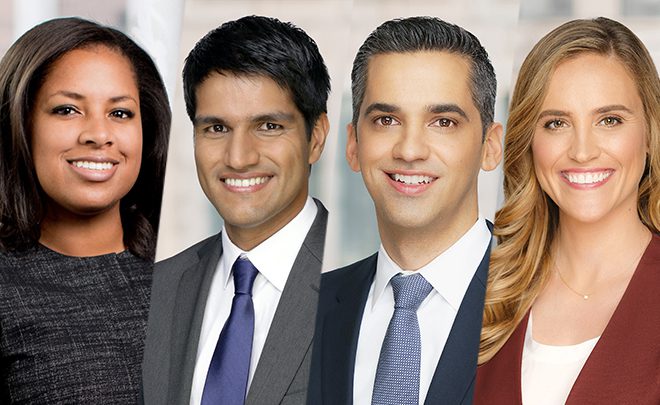Hueston, a founding partner of Hueston Hennigan LLP, tangled with Vital’s then-CEO, Jack Owoc, during multiple days of testimony that included Owoc raising his voice at Hueston during intense, combative testimony while being admonished repeatedly by U.S. District Judge Jesus G. Bernal of the Central District of California, who cited Owoc’s impeachment on the stand as a reason for finding the case “exceptional” and awarding the $43 million in attorney fees, expenses and prejudgment interest.
Getting the CEO of a multibillion-dollar company to break down on the stand was nothing new for Hueston, who was lead prosecutor with the U.S. Justice Department’s Enron Task Force in 2006 and earned a reputation as a star litigator for his tough questioning of Kenneth Lay, the company’s founder. Lay was convicted of conspiracy, wire fraud and securities fraud, and Hueston’s work is widely credited with having helped seal the government’s criminal cases against both Lay and former Enron CEO Jeffrey Skilling.
Hueston told Law360 that his firm went up against Owoc at a previous trial and saw how he could become combative when challenged, and used that during the false advertising trial. As Owoc became more aggressive on the stand, Hueston kept his cool while needling Owoc over inconsistencies in his testimony.
“With Lay, Owoc and any CEO of a company, they typically are trained in the public to control themselves and to deliver a different type of demeanor than what you might see behind the scenes,” Hueston said.
“Both in the Enron trial and here, particularly here, we had seen the explosive, out-of-control Owoc,” he continued. “So in these exams … the winning approach is to work with the facts and then find ways to surprise the witness in areas that they might not be as prepared on to get under their skin and to flip their demeanor, to get them to drop the mask of the sort of calm and focused CEO to reveal, you know, the anger, the rage and their reactions.”
Owoc “began to lose control” as he was challenged, Hueston said.
“I’ve been in that situation before when a witness starts losing their temper and getting angry with me,” Hueston said. “I inwardly smile. I knew it was going well when the jury itself stopped looking at him during the cross-exam.”
A Three-Planked Approach
Much of the trial focused on Vital’s advertisement for the key ingredient in its successful Bang energy drink, “super creatine,” which Monster argued is a useless ingredient that holds none of the benefits of traditional creatine, a common supplement used by athletes and bodybuilders. The false advertising was part of an overall pattern to “lie, cheat and steal,” Hueston told the jury during his opening statement.
Monster alleged that the false advertisement of super creatine cost it hundreds of millions in profits, and the jury agreed. The verdict was a devastating blow to Vital — which did business as VPX Sports — and was the second nine-figure court loss VPX suffered to Monster in 2022. Following the trial, VPX filed for bankruptcy, and Owoc was terminated as CEO by the company’s board. In July, VPX announced a $362 million sale to Monster in its Florida bankruptcy case.
Monster also brought claims for trade secrets theft and interference with Monster’s contracts over shelf space with some major retailers, with the jury finding in favor of Monster on those claims as well. While they weren’t big money items compared to the false advertising claims, they helped paint a picture of Vital as a company that cheated, both Hueston and Hueston Hennigan co-founder Moez M. Kaba told Law360.
Hueston and Kaba were co-leads at the trial, and attorneys Allison Libeu, Sourabh Mishra, Lauren Johnson, Michael Todisco, Julia Haines, Justin Greer and Amber Munoz also contributed to the firm’s win.
The trade secrets and contract interference claims helped make Monster more sympathetic in the eyes of the jury, so that it didn’t just look like a big company going after a rival — a top concern going into the trial, Hueston and Kaba said.
“One of [the concerns] was the idea that Monster, this large, very successful energy drink company, was suing another company, and would we be able to tell in a sufficiently compelling way why Monster is the right plaintiff and why Monster deserves relief,” Kaba said.
Hueston said the team “worked hard to build in contract interference and trade secret misappropriation because then we knew that we could present the jury with a comprehensive, corrupt course of conduct that they would understand appropriately requires a jury’s intervention.”
“And by coming at it on all three planks, I was able to say, and we were able to echo this in our examinations, that Bang had built itself into a billion-dollar enterprise by lying, cheating and stealing,” Hueston continued. “And the lying, cheating and stealing, each of those, connected to each of the three planks.”
The Science of Creatine
Getting the jury to understand the science of creatine, and the studies finding that “super creatine” is not creatine, was another challenge heading into the trial, Kaba said. Although VPX did not present any scientific studies and Monster conducted several finding that super creatine is useless, there was a concern about whether the jury would understand the studies, which often involved molecular structures, he said.
Using models with marbles and a lock-and-key to demonstrate the science helped make the scientific data accessible to the jury, Kaba said.
“That’s the kind of work that we do, these kinds of significant, involved cases,” Kaba said. “And our team was very focused from the moment we got this case all the way through the trial and thereafter, simplifying the scientific concepts and bringing the jury or the judge along with us on the journey of discovery.”
Kaba also said making the scientific data clear to the jury was critical because “not only was the science complex and required simplification, but we are living in a world sometimes where the state of scientific knowledge is really where people think that a study doesn’t really prove anything, and a set of studies doesn’t really prove anything. Consensus doesn’t really prove anything, right? So, [it was important] being able to say scientific consensus does matter, and we can understand the truth, the scientific truth of something.”
During the trial, Monster presented evidence that VPX made many false claims to consumers, retailers and distributors about super creatine, including that it boosts creatine levels as well as helps those suffering from Parkinson’s disease, Alzheimer’s disease and other ailments.
Hueston agreed that with those types of health claims, it’s conceivable that a government agency could have sued VPX, which made litigating the case similar in some ways to his work as a federal prosecutor.
“I agree, there’s both the fun and appeal of that, but that was also a danger in our case because we knew through mock trial efforts that often the jury said, ‘Well, this sounds like something the government would be involved in, so if they’re not here, this must just be a business dispute, and who cares,’” Hueston said.
“So part of how we framed this case was to make sure the jury understood that the laws of the United States were vesting them with this responsibility, to try and inoculate them from the notion that this sounds like a government issue and the government ought to be looking at it,” he continued.
Proving the Damages
After presenting evidence that VPX engaged in trade secret theft and contract interference, and showing the jury scientific data that super creatine is useless, Hueston Hennigan’s final key task was to prove that Monster was substantially harmed by the conduct.
One key strategy for demonstrating harm was showing the jury a survey finding that one in five cans of Bang sold would go to Monster beverages if super creatine were removed or if Bang buyers were more informed about the amount of super creatine in each can. Monster also presented damages experts, and the jury ultimately gave Monster nearly everything it asked for with a $293 million verdict.
After the trial, some jurors said “they were given a number from us, and they were basically given a zero from the other side about damages,” Kaba said, adding that if the jury “is going to rule for you on liability, they’re going to want to give you something. So zero was not a fair place for the jury to go. And that’s what one juror said to us. He said, ‘Well, I got a zero on one hand, and your number, and it obviously isn’t zero, so we went with your number.’”
Kaba also said one satisfying aspect of the trial was that “we had multiple associates, multiple women, multiple associates of color get up and take witnesses at this trial. Each of them just did a fantastic job. And that’s a big part of what we try to do as a firm as well, is sort of train the next generation of fantastic trial lawyers, and we were so impressed with them.”
David P. Muth of Quarles & Brady LLP, who represented both Owoc and VPX at the trial, declined to comment for this story.
–Editing by Karin Roberts.
How Hueston Hennigan Won Monster $336M False Ad Suit


